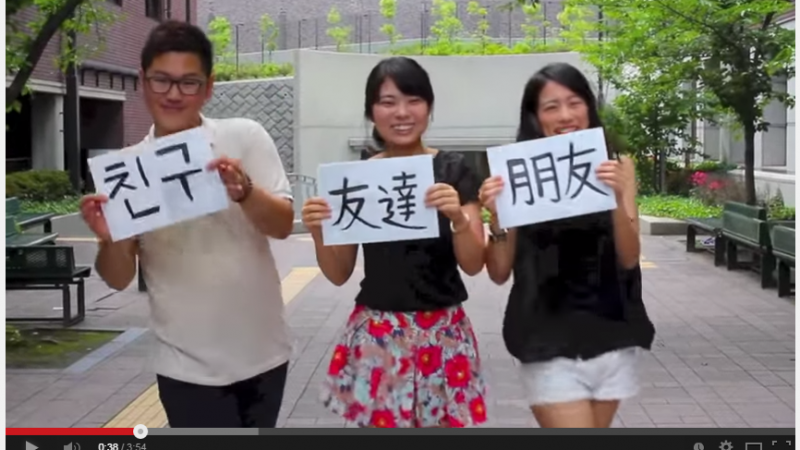
A screenshot of “Japan China Korea Happy” posted on YouTube on July 18, 2014
Taking inspiration from American singer Pharrell Williams’ “Happy” video, a group of university students in Kyoto, Japan are reaching out to the youth in China and Korea with a message of peace and friendship, something that the governments of the three nations have been struggling to achieve.
Sumireko Tomita, who played the leading role in making the video “Japan China Korea Happy,” decided to promote friendship among East Asian countries after she witnessed racist, xenophobic remarks against the residents in Korea towns of Osaka on her way to school, according to The Huffington Post Japan. The video, which was uploaded to YouTube mid-July, has more than 161,000 views.
The description of the video on YouTube reads:
“Japan-China-Korea HAPPY” was made by Japanese university students wishing for the peace between the three countries. These three countries may have sensitive historical relations, but younger generations are willing to work on to fix and have better relations for the better future. The ‘HAPPY’ music video makes people smile and happy. That's why we made this video with young people from the three countries. This video was mainly filmed in Japan, but also some clips were filmed in South Korea and China. We hope that this video helps to spread smiles and encourages ever bettering futures for these three countries.
Among non-Japanese nationals living in Japan, ethnic Koreans make up of largest demographic throughout Japan, but Osaka and Kyoto have particularly high ratios of Korean residents compared to ones in other prefectures. For a travel destination that attracted over one million foreigners last year, Kyoto certainly would not want to promote racism and xenophobia.
The video was made with help of foreign students. Over a hundred students participated in the production of the video including those studying in Kyoto as well as ones overseas.
Muwa Yamada, a Japanese expat in New York, watched the video commented:
Those college kids showing us that we have a constructive positive way to deal with the many issues we have. I think the bottom line is that we're all breathing the same air.
It has been more than two years since the government officials of Japan, South Korea and China held high-level talks (and they are finally breaking the silence this week at the vice ministers’ talk in Seoul to mend their relationship). The relations among the three have been strained due to disputes over territory and history. Japan and China have sparred over who owns the Senkaku Islands (China refers to them as Diaoyu, Taiwan as Tiaoyutai ), and Japan and South Korea have similarly feuded over the ownership of Takeshima islets (Korea refers to it as Dokdo). Anti-Japan protests and anti-Korean protests have mutually giving bad impressions of the other, as well.
Another YouTube user, “矢神悠希” (YAGAMI Haruki), emphasized that young people can make a difference:
みんな政府からの影響ですぎでしょ。
若い世代がhappyになれば、”政府の”友好関係も変わるんじゃない?
それを変えようとせずいがみ合うだけなら解決はないと思う。
自分達でやる前に否定はよくないな。
It seems everyone is excessively influenced by their government.
Once the young generation becomes happy, the relationship between these governments will change.
If you keep snarling at each other, there won't be any solution.
Disapproving of the video without taking action [for better ways to change the relationship] is not good.
The video promoting friendship across the three countries was also the target of criticism and at times vicious comments. Most of these comments tried to put a damper on the happy mood by bringing up historical issues and diplomatic problems among the nations.
Des Moore, a YouTube user whose profile says he or she is American-born and raised in Japan, commented in rebuttal, saying that bringing politics into the matter is pointless:
日中韓の一般市民レベルの交流を促進してる動画なのに、外交問題や歴史問題を持ち出してる人は何事? 本質を見失ってるような。向こうの国で普通に生きてる人は、そんな反日に燃えた人でもないだろうよ。こっちにニュースとして届いてるってことは、そういった活動は向こうの目から見てもイレギュラーな事態ってことだし、全員が全員反日じゃないっつうの。肩の力抜けよみんな。
What's the matter with these people bringing diplomatic issues and historical issues to the table, when the video is solely promoting civil exchange among Japan, Korea and China. Most of the people living in Korea or China should be living a normal life, and not all of them are energetically against Japan. The fact that anti-Japan demonstrations makes news headlines means that such activities are unusual and not normal, and that not everyone is against Japan. Relax, everybody.
The Asia-Pacific Economic Cooperation (APEC) forum in Beijing and ASEAN summit in Myanmar for Southeast Asian countries plus China, Korea and Japan in coming November, could be the chance for government nationals to thaw their relationship.







1 comment